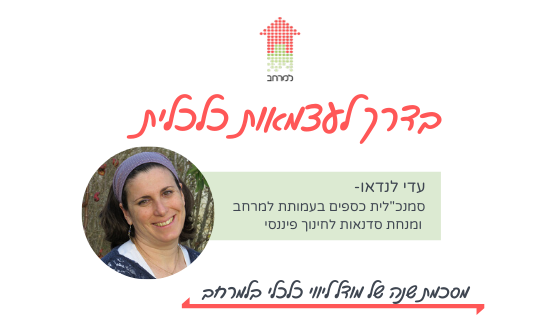In 2019, Lamerhav has launched its economic mentoring program, led by Adi Landau, accountant and CFO of Lamerhav. Adi provides personalized guidance and support, and conducts meetings and online chats for Lamerhav’s young adults on various topics: living on a budget, debts, workers’ rights, credit, savings, etc. The various sessions focus on providing information, training and tools to help the young adults deal with the economic challenges that they are facing.
To sum up a particularly successful year, we asked Adi a few questions about the program:
Why is the economic mentoring model so meaningful for Lamerhav’s young adults?
Lamerhav has identified the young adults’ need for guidance and support in the field of financial conduct. Therefore, it provides young adults with personalized counseling and answers to any question they may have. Over the past six months, several internet groups were created on various topics. I also met with 15 young adults that have received advice on topics such as: taking loans, managing a bank account, utilization of employee rights, savings and investments, meeting spending targets and wise consumerism. Lamerhav took part in a national survey on the topic of young adults dealing with debts, and shared the economic mentoring tools and principles that we developed, with the body conducting the survey.
What financial difficulties do young people deal with?
First of all, not everyone has difficulties… Sometimes the questions are simply what’s right or wrong, or an explanation of concepts and calculations, where and how one should save money. Of course, the help is very much needed in case the young adult is found in a situation of overdraft in the bank or has loan that he needs to repay.
Many young adults also turn to us in case of life changes, such as moving to a new apartment, changing their course of studies, wanting to go abroad or starting an independent business. These are cases, where thinking and planning based on the financial data is essential.
What is special about working with young adults in a financial context? Do you have any successes?
Working with young adults is important, because their economic behavior is not yet fixed, and so, we can still change bad or damaging habits. You can also direct one’s attention to data or exceptions that are sometimes overlooked, such as what is the real price of cigarettes, how much do I spend each month on eating out, or whether I get the wages and benefits I am entitled to by law.
The period, in which the young adult is open to learning and understanding his lifestyle, and his income flexibility, is relatively long, and his ability to save up money is relatively high (still no heavy obligations, such as a mortgage and providing for a family). This allows for significant changes in a relatively short time and a commitment to achieving goals.
Successes can be seen even once the conversation is over – the young adult’s ability to understand the financial concepts that are part of his life, to fear less of the money issue, and to take control of his life.
And of course, young adults, who set realistic goals for themselves, see the results in their bank accounts!
How does the actual financial mentoring process take place?
In practice, it is easy to schedule a one-on-one meeting with me. The meetings are in coordination with the young adult’s personal counsellor, and sometimes initiated by him. At the meeting, I go over the young adult’s financial situation (depending on what he is willing to reveal and share). We talk about concepts and data and clarify what is unclear.
Then, depending on the relevant area, we set preferable goals and objectives that can improve the financial situation. This can mean changing and reducing current expenses, utilization of rights, increasing revenues, clarifying and checking data, changes in loan status and budget planning.
My main goal is to reduce anxiety regarding the issue, to give the young adult a sense of control and ability to make changes, and to motivate him to reach new goals that will improve his situation.
How do you see the economic mentoring program in 2020?
We understand that the problem of “economic ignorance” is applicable also to all young adults aged 20-30, who belong to a generation characterized by the search for meaning, but is also sometimes lost and confused. This is why we made a decision to promote various initiatives that propose to offer the economic mentoring model developed by the organization, to different entities and bodies.
In the area of young adults at risk, we would like to reach the staff and counsellors in other organizations, in order to provide training and guidelines for integrating financial mentoring while addressing the young adult’s financial situation, as part of the support process.
We intend to open additional platforms for communication with young adults, in order to provide information and answers to questions in the economic domain (such as chats in various areas through the organization’s website, a tool for managing groups that we operate, and an information center that will be developed in the future).
In the young adults’ general public, we are looking for new collaborations and channels to bodies that see importance in promoting the issue, and understand the need to address the economic field as part of increasing the young adults’ capability for independent living.



